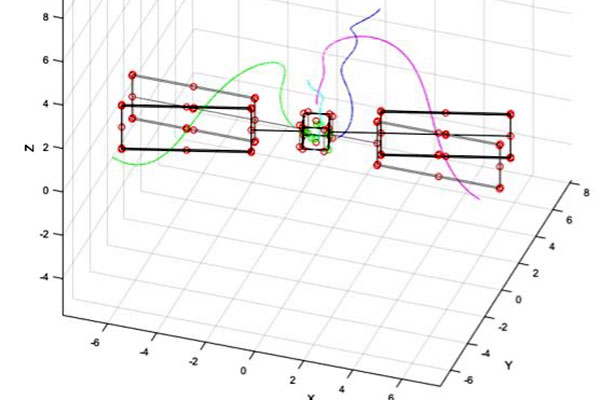Florida Tech’s ORION Lab Continues to Explores Algorithm for Space Repair and Debris Removal
By Ryan Randall, Florida Tech // December 14, 2021
project started in spring 2021

BREVARD COUNTY • MELBOURNE, FLORIDA – Florida Tech’s Orbital Robotic Interaction, On-orbit servicing, and Navigation Lab is working on a new way to assist with the growing problem of space debris.
Led by Markus Wilde, aerospace engineering associate professor, Brian Kish, aerospace and flight test engineering associate professor, and Ryan White, mathematical sciences assistant professor, a multidisciplinary team of graduate and undergraduate students in developing image processing software, artificial intelligence algorithms, and guidance laws to identify and track features on space objects and to prepare for the removal of space junk.
The algorithms locate where a servicing satellite could attach to a client spacecraft without damaging its delicate (and very expensive) parts, such as a solar panel or an antenna.
The same algorithms can also be used for spacecraft locating and removing space debris, enabling them to capture and stabilize large, non-cooperative, tumbling debris objects.
The project is funded by AFWERX as a Phase II small business technology transfer, in collaboration with Melbourne company Energy Management Aerospace.
The project started in spring 2021 and the team has published two conference papers at the SmallSat Conference and the AIAA ASCEND, with two additional papers having been accepted for the IEEE Aerospace Conference next March.
Currently, the lab is tweaking the ways they can improve the algorithm by using a vast database of images of satellites to train the algorithm on the important parts of spacecraft.
While the lab has the guidance part of the algorithm developed, connecting it to the part of the system that recognizes the hands-off components of the spacecraft is still a work in process.
“Up to now, that [process] has usually been the job of people, and what we want to do is enable the robot or robotic spacecraft to do that autonomously,” Wilde said.
“Basically, we are trying to leverage machine learning so that we teach the algorithm what an antenna or thruster looks like, then we use real-time imaging that we create in the ORION Lab in different lighting conditions and in different motion status.”

In space debris removal research, there are key factors at play. Like with the servicing satellite research, where a satellite grabs space debris is important, as fragile parts could break off, creating yet more debris.
The characteristics of how the debris moves will also need to be accounted for to achieve easier and accurate removal.
In addition to the current AI research, the team is also looking at thruster systems that will allow the automated satellite system to follow what Wilde describes as a “pretty aggressive trajectory.” This work is explored in a senior capstone design project in collaboration with graduate students.
The lab also investigated capture tools that will be able to attach a satellite to any surface on the target through another senior design project.
The team is hoping to attract funding for this and similar work from the U.S. Space Force, which has demonstrated a growing interest in space debris removal technologies, including the November launch of its Orbital Prime program.
CLICK HERE FOR BREVARD COUNTY NEWS














